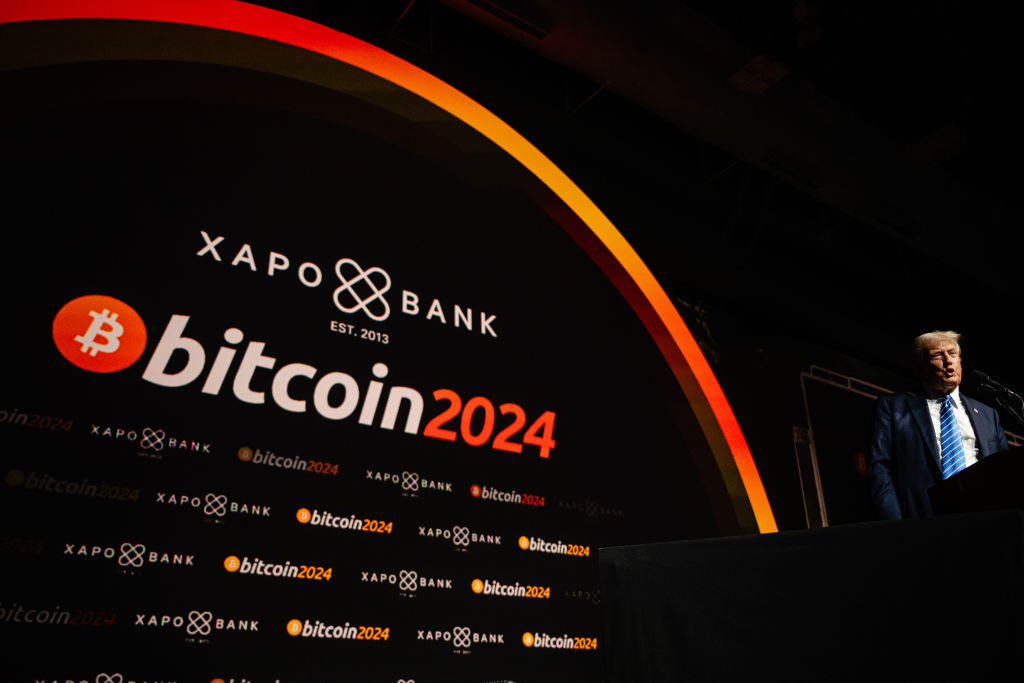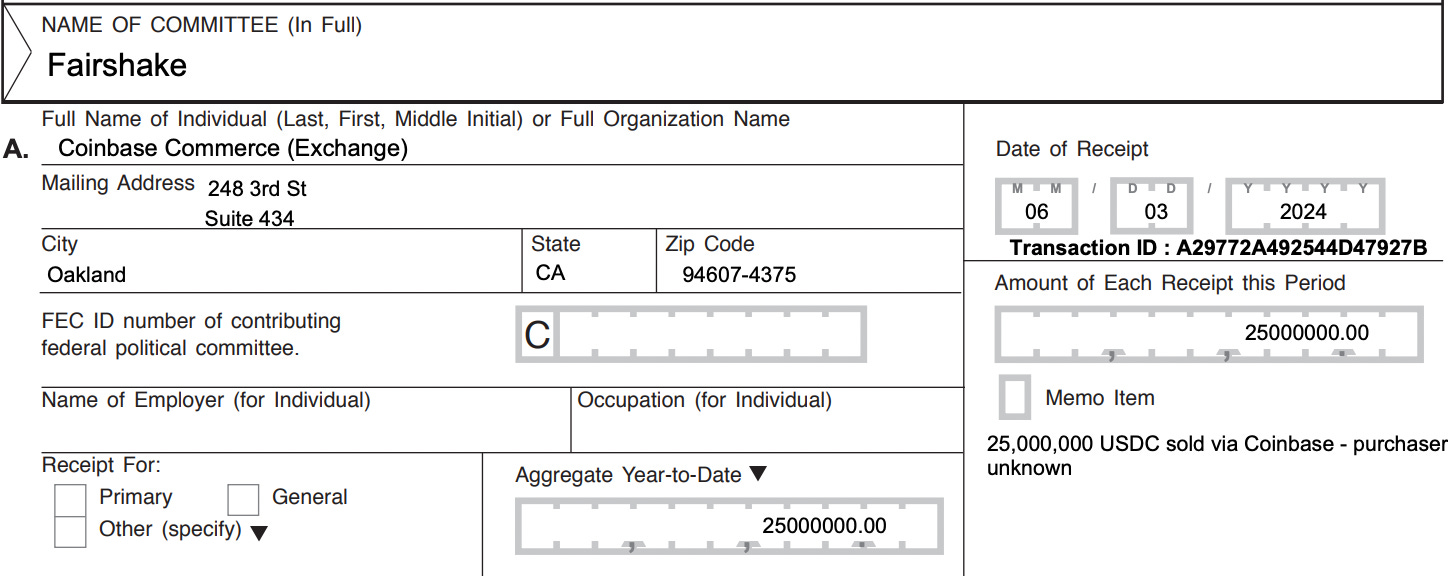How the crypto industry is buying political support with 202 million U.S. dollars

15 years after Bitcoin was created, there are still few legitimate use cases. Today, Bitcoin and other cryptocurrencies are primarily used for financial speculation and to facilitate organized crime. The broader crypto industry, meanwhile, has been rocked by scandals, including the spectacular implosion of FTX and criminal charges against Binance.
But crypto lobbyists still have one ace up their sleeves: lots of money.
The industry's primary Super PAC, Fairshake, has raised over $202 million in the 2024 election cycle. Most of this money was collected in the form of 8-figure contributions.
Coinbase alone has donated $70 million so far, and crypto investors like Ben Horowitz, Marc Andreessen, and the Winklevoss twins have written multi-million dollar checks. The largest individual donors are also supporting Trump's candidacy. This money dwarfs the spending by Sam Bankman-Fried in the 2022 election cycle. Of the approximately $45 million Fairshake and its subsidiaries have expended thus far, two-thirds was used to attack Democrats or support Republicans. The cash stockpile positions the industry to be one of the most powerful forces in politics over the next 100 days.
The strategy appears to be paying off.
Speaking to the Bitcoin Conference in Nashville on Friday, Senator Cynthia Lummis (R-WY) said the federal government should create "a strategic Bitcoin reserve." Lummis intends to introduce legislation that would require the federal government to purchase 1 million Bitcoin — about 5% of the total available — for $68 billion. Lummis said her proposal was "the solution" to America's financial issues, describing the opportunity to purchase lots of Bitcoin as "our Louisiana purchase moment."
According to Lummis, her plan to purchase Bitcoin would allow the United States to become "debt-free." More specifically, Bitcoin would "cut our debt in half by 2045." But even if the federal debt did not grow at all in the next 20 years, the price of Bitcoin would need to increase by 250 times to halve the current debt of $34 trillion. In other words, the price of one Bitcoin would have to increase from $68,000 to $17,000,000.
Jacob Silverman, a journalist who covers the crypto industry and the co-author of the New York Times bestseller Easy Money: Cryptocurrency, Casino Capitalism, and the Golden Age of Fraud, explained that Lummis' prediction puts her in league with hardcore Bitcoin bulls like Michael Saylor. At the Bitcoin Convention, Saylor predicted that a Bitcoin would be valued at $13 million by 2045. (Saylor's company, MicroStrategy, currently owns 226,331 Bitcoin.)
Although Lummis calls her Bitcoin reserve proposal "strategic," holding Bitcoin has no discernable strategic value for the federal government. Unlike oil, there is nothing for the federal government to do with Bitcoin, other than hold it as a speculative investment.
But if the federal government purchased 5% of the available Bitcoin, it would drive the price of Bitcoin up. This is both because it would reduce the supply of available Bitcoin, and it would give Bitcoin the imprimatur of the federal government. Artificially driving up the price of Bitcoin is of interest to potential donors to Lummis — and Lummis herself.
In May 2022, Lummis reported that she owned between $100,000 and $250,000 in Bitcoin. She made purchases of Bitcoin in August and September of 2021, a few months after becoming a Senator. If Lummis' proposal to create a federal strategic Bitcoin reserve becomes law, it would likely result in a significant increase in her personal wealth.
Trump, who called crypto a "scam," pledges to make the U.S. the "crypto capital of the planet"
The day after Lummis appeared at the Bitcoin Conference, Trump addressed the group. Trump did not specifically endorse Lummis' proposal but pledged to create a national “strategic national Bitcoin stockpile,” starting with the Bitcoin already held by the federal government. He also promised to end the practice of the federal government selling cryptocurrency seized or acquired. When the government sells large amounts of a cryptocurrency, it sometimes causes the price of the cryptocurrency to plummet. The announcement, as well as Trump's attendance at the conference, was welcome news to the crypto industry.
More broadly, Trump pledged to make the United States "the crypto capital of the planet and the Bitcoin superpower of the world." He also promised to end what he called the Biden administration's "attacks on crypto," describing efforts to enforce laws and protect consumers as "part of a much larger pattern" by "left-wing fascists to weaponize government against any threat to their power." Instead, he promised to create new regulations “written by people who love your industry, not hate your industry.”
According to Silverman, while the federal government purchasing Bitcoin would be a welcome development, the priority of the crypto industry is the creation of a friendly regulatory structure that would reduce its legal exposure. That is exactly what Trump is promising to deliver.
It is a remarkable turnaround from Trump. In 2021, Trump derided cryptocurrency as a "scam" and "potentially a disaster waiting to happen."
His trip to Nashville included some clues about what might have changed Trump's mind. Trump reminded the audience that he is "the first major party nominee in American history to accept donations in Bitcoin and crypto." On Saturday evening, Trump held a fundraiser courting crypto enthusiasts, with tickets going for as much as $844,600.
Harris reportedly seeks to improve relationship with crypto industry
Democrats are not immune to the appeal of an industry boasting a couple of hundred million dollars available to spend on political campaigns. Although Vice President Kamala Harris did not appear at the Bitcoin Conference, the Financial Times reported on Saturday that Harris' advisors "have approached top crypto companies to 'reset' relations between her Democratic party." According to the report, Harris' political operation is seeking meetings with influential crypto companies, many of which are funding Fairshake, including Coinbase and Ripple.
Harris' campaign advisors said that outreach "had little to do with attracting new electoral contributions" and was geared toward building "a constructive relationship that would ultimately set a smart regulatory framework that would help the growth of the entire asset class."
According to the Financial Times, Harris herself is interested in changing "the perception among many top executives America that the Democrats were anti-business." Crypto executives are "hopeful Harris will be more sympathetic to them."
Additional research by Mohan Legum.



Bitcoin struck me as having that whiff of criminality when it first was introduced. That whiff has now become a stench thanks in part to the legal bribery enabled by "Citizens United."
What an ironic name, eh?
We should all be appalled by lobbying and the whole “money is speech” concept. We as individual voters should have as much influence as special interest groups. All campaign financing should be band and candidates should get a set amount with which to campaign. This is one reason why democracy is under siege. Special interests (corporations , organized religions, etc.) don’t have the power to in true democracy. The people do.